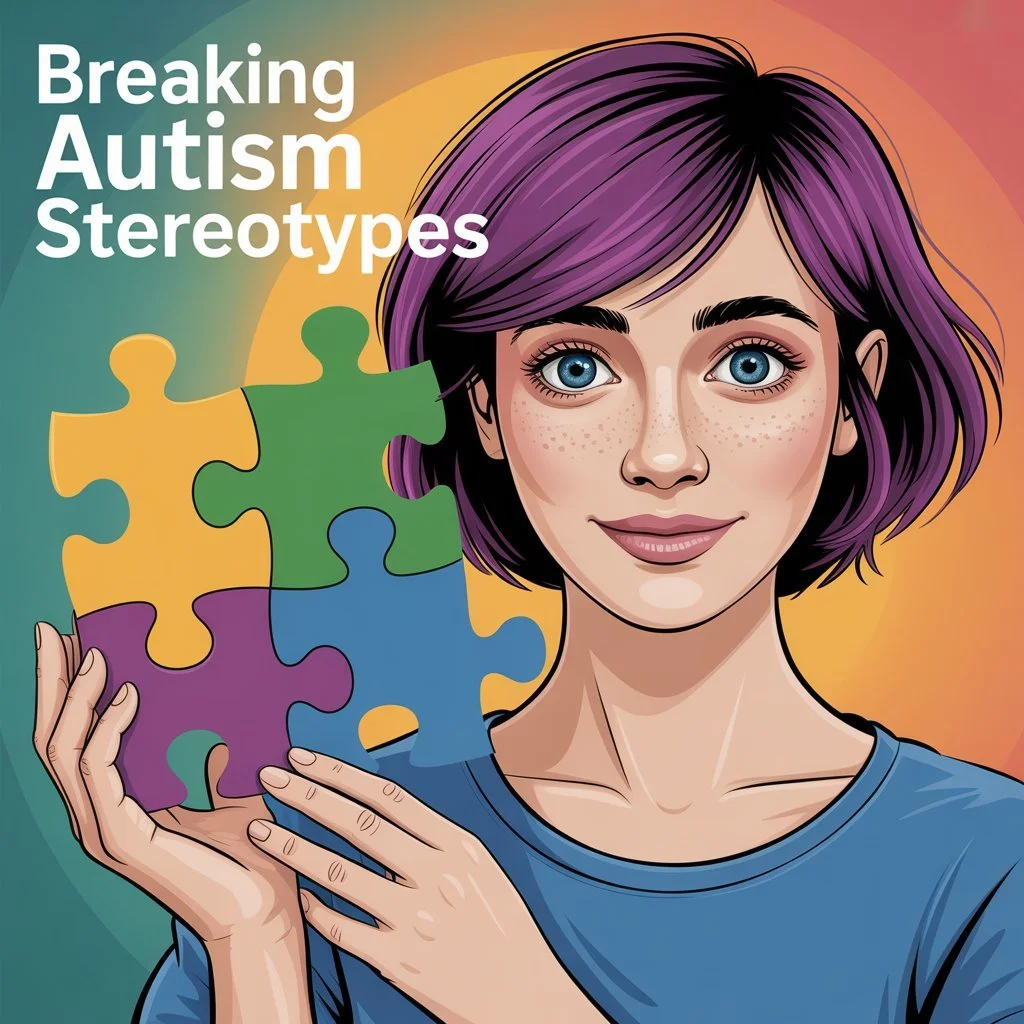Breaking Autism Stereotypes
Table of Contents
Intro
The Struggle with Connection
Finding Belonging in Unexpected Places
Turning Passion into Purpose
From Advocate to Motivational Speaker
Breaking Autism Stereotypes
Lessons for Everyone
Conclusion
Breaking Autism Stereotypes
Society often views autism through a very limited perspective. Many people only see the stereotypes that have been repeated over time, such as the belief that autistic individuals lack empathy or cannot communicate. These assumptions overlook the complexity of the spectrum and the individuality of each autistic person. Real stories, shared in honest and personal ways, have the power to challenge these misconceptions and create a deeper understanding.
In this episode of On the Spectrum Empowerment Stories, Sam Mitchell opens up about his own journey. Sam is an autistic self-advocate, podcaster, and motivational speaker. He talks about what it was like to grow up on the spectrum, how he learned to embrace his identity, and how he now uses his platform to educate others and break down harmful stereotypes.
This blogpost will highlight the major lessons from Sam’s story. You will see how he turned his personal struggles into strengths, how he found belonging by being true to himself, and how his advocacy continues to create awareness about autism.
To fully experience Sam’s passion and authenticity, make sure to listen to the full podcast episode where he shares his journey in his own words.
The Struggle with Connection
While Sam was fortunate not to experience direct bullying, his childhood was still marked by a different kind of pain. He often felt socially excluded, not because people were intentionally cruel, but because his interests and way of connecting were different from those around him.
One example he shared was his love for professional wrestling. To him, wrestling was exciting and meaningful, but most of his peers could not relate to that passion. Instead of sharing conversations and building friendships through common interests, he often found himself on the outside looking in. This created a sense of loneliness that lingered throughout his younger years.
Sam’s experience shows that isolation is not always the result of bullying or harsh words. Sometimes, exclusion happens more quietly when people simply do not make the effort to understand or include someone who is different. The absence of connection can be just as painful as outright cruelty because it reinforces the feeling of being unseen or misunderstood.
The takeaway is clear: empathy and inclusion matter deeply. By showing curiosity about another person’s interests and making space for differences, we create opportunities for connection. Small gestures of understanding can transform an environment from isolating to welcoming.
Finding Belonging in Unexpected Places
As Sam grew older, particularly during his teenage years, he reached an important turning point. After years of trying to fit in with peers who did not fully understand him, he decided to stop chasing acceptance from people who could not see his value. This shift in mindset was powerful. Instead of molding himself to be like everyone else, Sam began to seek out spaces where he could simply be himself.
What he found was a community of people who also felt different or misunderstood in their own ways. These were peers who did not expect him to hide his quirks or change his interests. They welcomed him as he was, and in turn, Sam realized that being different did not mean being alone. This acceptance allowed him to build authentic friendships and experience the sense of belonging he had long been missing.
The result was more than just companionship. This new community gave Sam a renewed sense of confidence. For the first time, he could show up without pretending, masking, or shrinking himself to fit into other people’s expectations. That freedom opened the door to deeper self-acceptance and the ability to walk through life with his head held high.
The lesson here is that true belonging does not come from trying to win the approval of everyone around us. It comes from connecting with people who appreciate us exactly as we are. When we stop chasing external validation and instead embrace relationships built on mutual respect and understanding, we find the kind of belonging that nourishes the soul.
Turning Passion into Purpose
For Sam, professional wrestling was never just entertainment. From an early age, it sparked excitement, curiosity, and deep focus. What some might have dismissed as “just a hobby” became a foundation for creativity and self-expression. Professional wrestling gave Sam a way to connect with larger-than-life stories of struggle, resilience, and triumph. It also gave him language and imagery to make sense of his own experiences of feeling different and pushing through challenges.
Instead of letting his passion remain private, Sam found a way to share it with others. This is what eventually led him to create his podcast, Autism Rocks and Rolls. What started as an outlet for self-expression grew into something much bigger. On the podcast, Sam not only highlights the voices of autistic individuals but also bridges his love for wrestling by interviewing professional wrestlers. This unique mix allows him to draw connections between the strength, resilience, and individuality celebrated in wrestling and the lived experiences of people on the autism spectrum.
Through this platform, Sam transformed what many might have labeled a “special interest” into a tool for advocacy and awareness. His podcast became a space where listeners could learn about autism in a real, human way—directly from someone living it. It also challenged the stereotype that autistic people cannot lead, communicate, or inspire. By following his passion and using it to educate and empower, Sam proved that interests are not limitations but powerful springboards for purpose-driven work.
From Advocate to Motivational Speaker
Sam’s journey did not stop at creating a podcast. What began as a platform to share his story and amplify autistic voices eventually opened the door to public speaking. Over time, Sam realized that his message carried weight beyond the digital space. By stepping onto stages and speaking directly to audiences, he was able to connect with people in a deeper and more immediate way.
As a motivational speaker, Sam educates schools, communities, and organizations about what it truly means to live with autism. His talks dismantle long-standing stereotypes that paint autistic individuals as “less than” or incapable. Instead, he reframes the conversation by highlighting that autistic people are not broken. They simply experience and process the world differently. This perspective shifts the focus from limitations to possibilities, encouraging listeners to view autism through a lens of respect, understanding, and inclusion.
Through storytelling, Sam helps audiences see the humanity behind the label. He blends personal experiences with practical insights, making his talks both relatable and eye-opening. His presence on stage also serves as a powerful counter to stereotypes, as he embodies confidence, clarity, and leadership—qualities that some assume autistic people cannot express.
The key takeaway is that advocacy grows when personal stories move from small circles to bigger platforms. By sharing his truth on public stages, Sam not only spreads awareness but also inspires others to create inclusive environments where differences are celebrated. His evolution from podcaster to speaker demonstrates how personal passion, when combined with courage, can ripple outward and spark meaningful cultural change.
Breaking Autism Stereotypes
One of the biggest barriers autistic people face is not the condition itself, but the stereotypes that surround it. Society often assumes that autistic individuals cannot communicate effectively, struggle with empathy, or lack the ability to build meaningful relationships. Sam’s life is a direct challenge to those assumptions. Through his podcast, his public speaking, and his openness about his own experiences, he shows that autistic people not only communicate but can do so with passion, clarity, and purpose.
Sam also emphasizes the importance of individuality. Autism is not a one-size-fits-all experience. Just as no two neurotypical people are the same, no two autistic people are identical either. Some may be introverted while others thrive in social situations. Some may express themselves best through words, others through art, music, or unique passions. By highlighting this truth, Sam helps people see beyond the label and recognize the human being behind it.
His own journey illustrates the incredible strengths that often come with autism. Qualities such as deep focus, creativity, persistence, and determination can all be powerful assets when nurtured and valued. What some may dismiss as a limitation is often the very trait that helps autistic individuals excel in areas they are passionate about. For Sam, his intense focus on professional wrestling not only gave him joy but eventually led him to build a platform for advocacy.
The key takeaway is simple but profound: stereotypes crumble when we listen to lived experiences. Instead of relying on outdated assumptions, hearing directly from autistic voices reveals the richness, diversity, and capability within the community. By sharing his story, Sam not only redefines what autism can look like but also invites others to challenge their own perspectives and embrace a more inclusive view of neurodiversity.
Lessons for Everyone
Sam’s story is not only about autism, it is about what it means to be human. One of the most important lessons he shares is that inclusion goes far beyond simply avoiding harm. True inclusion means actively choosing to value and embrace the differences that make each person unique. It is about creating spaces where people are not just tolerated, but celebrated for who they are.
Another powerful lesson is the value of special interests. Too often, society dismisses them as obsessions or quirks. In reality, they are passions that can fuel creativity, purpose, and even careers. When we encourage people to lean into what excites them instead of forcing them to conform, we open doors to innovation and fulfillment.
Sam’s journey also shows that belonging may require redefining what we think of as “normal.” The traditional idea of fitting in often means changing ourselves to match the majority, but real belonging happens when we connect with people who appreciate us exactly as we are. This shift in perspective benefits not only autistic people but everyone searching for genuine connection.
Finally, voices like Sam’s are essential in reshaping how the world understands autism. Hearing directly from those with lived experience breaks down stereotypes and replaces them with compassion and truth. The more we listen, the more we learn that diversity—whether neurological, cultural, or personal—is a strength that enriches communities.
Conclusion
Autism is not a stereotype. It is a wide spectrum of lived experiences, each one unique, valuable, and worthy of respect. Sam’s story is a clear reminder that no single narrative can define what it means to be autistic. By stepping forward and sharing his truth, he invites us to see beyond the labels and challenge the narrow ways society often frames autism.
The key message is simple yet profound: when autistic voices are the ones leading the conversation, we all gain a deeper and more accurate understanding. We learn to see the strengths, creativity, and humanity that might otherwise be overlooked. Inclusion begins with listening. It begins with pausing our assumptions long enough to hear stories like Sam’s.


